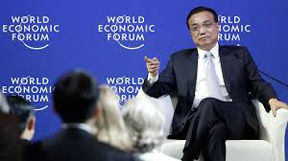 BEIJING: Allaying fears over China’s economic slowdown, Premier Li Keqiang has said that the future of the world’s second largest economy is “bright” due to its solid base and ruled out any hard landing.
BEIJING: Allaying fears over China’s economic slowdown, Premier Li Keqiang has said that the future of the world’s second largest economy is “bright” due to its solid base and ruled out any hard landing.
Despite the economy slowdown to seven per cent, China contributed roughly 30 per cent to world economic growth during the first half of this year, Li said.
The Chinese economy will not take a “hard landing”, he said. But at the same time Li noted that China’s seven per cent growth during the first half of this year was not an easy achievement amid the slowing world economy.
He said that a seven per cent rise for a USD 10 trillion economy is higher in volume than the 10 per cent growth seen in the past and places China among the top of the world’s major economies.
A more encouraging sign, according to Li, is that China’s economy is more oriented toward consumption, which accounts for half of China’s economic output and 60 per cent of growth.
“The Chinese economy has only a bright future,” he said.
Speaking at the opening ceremony of the Summer Davos meeting in Dalian in northeast China yesterday, Li said his faith was not borne out of blind optimism but based on its huge potential and tenacity.
He said major programs to promote new industrialization; IT, urbanization and agricultural modernization are now in progress to revamp the economy.
China’s variety of industries guaranteed an economy characterized by resistance and self-recovery, Li said.
Structural reforms, to realize sustainable economic expansion, have been successful, the premier said.
As the largest developing country in the world, China will continue to roll out measures to maintain medium-high growth with higher efficiency and quality.
In a speech televised live, Li highlighted the reform of the financial sector, stressing the importance of market and laws in fostering a fair, transparent and stable capital market as well as improving risk controls.
China has the support of high savings and large foreign exchange reserves, and reforms will improve the usage of such resources to support the real economy.
Besides cutting interest rates and reserve requirement ratios, China has scrapped the interest rate ceiling for both loans and deposits, and will allow more private capital to enter the sector as well as boost private banks, financing assurance and financial leasing, he said. Li also mentioned the recent changes to the yuan’s central parity system, stressing that the move had nothing to do with boosting exports, and the country is unwilling to see a currency war, as it will be harmful to China.
The inter-bank foreign exchange market will be opened to foreign central banks, and a cross-border RMB payment system will be established by the end of 2015 to improve the yuan offshore market, Li said.
He also highlighted innovation and entrepreneurship as a key growth driver for China.
“Millions of small and micro enterprises are the hope and future of China,” he said, sharing a visit he made to a small “maker enterprise” in Dalian yesterday.
The micro-controller company, he said, only has 10 employees but managed to attract 280,000 registered engineers within two years and developed more than 100 products.
He said the company aims to upgrade 30,000 outdated machines in the former heavy industry base of northeast China, so as to exploit the values of these old machines.
There are tens of thousands of similar companies in China that can achieve their dreams by pooling their wisdom and resources, Li said.
“They deserve the title of ‘new champions'”.
In his interactions with CEOs of top multinationals of the world, Li said China’s growth is in proper range and Beijing has no plans to depreciate Yuan further.
China has no intention of boosting export through the depreciation of yuan, Li said, playing down the global concerns over the recent four per cent depreciation which sent ripples across the world.
China is unwilling to see a currency war, as it will be harmful to China, Li said.
Using yuan depreciation to boost China’s export does not accord with the structural readjustment of the Chinese economy and export businesses also want the yuan to remain stable at an equilibration level, he said.
China resorted to about four per cent depreciation affected in the span of two days last month which had a cascading affect in India other world markets.
There is no basis for continuing the depreciation of yuan, he said, indicating that there will be no more depreciation.
A continuous depreciation of yuan, which will not benefit the internationalization of the Chinese currency, is not a policy choice for China, Li added.–PTI






